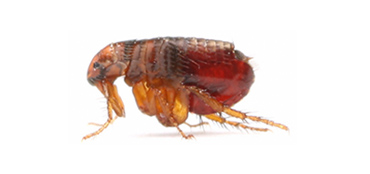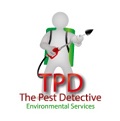Pest Control - Fleas
Categories
SIGNS OF RODENTS
WHAT TO LOOK FOR
Flea Control

Extermination Services
We provide Chemical and Heat flea control services to eradicate fleas from your property. With Same Day Call Out we’ll tackle any flea problem fast and effectively.
We Provide:
- Chemical & Heat flea Extermination
- We work to ensure fleas stay gone
- Fully Certified Service
- Same day call out
- Competitive pricing
- Call now for free Flea extermination & removal advice
01202 042814
How To Identify A Flea
- Adults small, wingless, about 2.5 mm long
- Their bodies are shiny and reddish brown in colour
- Covered with microscopic hair and are compressed to allow for easy movement through animal fur
Behaviour, Diet & Habits
Adults are parasites that draw blood from a host. Larvae feed on organic debris, particularly the faeces of adult fleas, which contain undigested blood. Fleas commonly prefer to feed on hairy animals such as dogs, cats, rabbits, squirrels, rats, mice and other domesticated or wild animals. Fleas do not have wings, although they are capable of jumping long distances.
Reproduction
Eggs are not attached to the host. Eggs will hatch on the ground, in rugs, carpet, bedding, upholstery or cracks in the floor. Most hatch within two days.
Fleas In The House
Fleas depend on a blood meal from a host to survive, so most fleas are introduced into the home via pets or other mammal hosts. On some occasions, fleas may become an inside problem when the host they previously fed on is no longer around. Then fleas focus their feeding activity on other hosts that reside inside the home. An example of such a situation is when a mouse inside the home is trapped and removed, the fleas that previously fed on the mouse are then forced to feed on pets or people.
Employing exclusion practices is important for many pest problems, but exclusion does not have a major, direct benefit for flea control. However, sealing cracks, gaps and holes to help keep rodents or other potential hosts from gaining access into the home is an important indirect way to keep fleas outside. The most effective ways to keep fleas from getting inside the home is to eliminate outdoor flea habitats and outdoor hosts, plus using area-wide flea control chemical products and veterinarian-approved flea control products on pets.
How To Identify and Manage a Flea Problem
Since fleas are relatively easy to see in their adult stage, most of the attention is directed at adult fleas. Adult fleas are usually easy to locate, especially if the homeowner and their pets return to the house after a long vacation or other absence during which the resident flea adults were not able to take a blood meal. Upon returning, the homeowners are often greeted by fleas jumping around and trying to land on them and their pets.
The flea eggs, larvae and pupae are another situation. Since these stages are much more secretive and much less active, they are found in out-of-the-way places like behind, under or in the furniture; in the pet’s bedding; inside cracks and grooves in the floors; and in the carpets. Flea eggs that were deposited by the female adult, fall off your pets as they move, allowing them to be disbursed throughout the environment where a pet spends time. Flea eggs represent about one-half of the entire flea population present in an average home. Larvae make up about 35 percent of the flea population.
Flea Control

Extermination Services
We provide Chemical and Heat flea control services to eradicate fleas from your property. With Same Day Call Out we’ll tackle any flea problem fast and effectively.
We Provide:
- Chemical & Heat flea Extermination
- We work to ensure fleas stay gone
- Fully Certified Service
- Same day call out
- Competitive pricing
- Call now for free Flea extermination & removal advice
01202 042814
How To Identify A Flea
- Adults small, wingless, about 2.5 mm long
- Their bodies are shiny and reddish brown in colour
- Covered with microscopic hair and are compressed to allow for easy movement through animal fur
Behaviour, Diet & Habits
Adults are parasites that draw blood from a host. Larvae feed on organic debris, particularly the faeces of adult fleas, which contain undigested blood. Fleas commonly prefer to feed on hairy animals such as dogs, cats, rabbits, squirrels, rats, mice and other domesticated or wild animals. Fleas do not have wings, although they are capable of jumping long distances.
Reproduction
Eggs are not attached to the host. Eggs will hatch on the ground, in rugs, carpet, bedding, upholstery or cracks in the floor. Most hatch within two days.
Fleas In The House
Fleas depend on a blood meal from a host to survive, so most fleas are introduced into the home via pets or other mammal hosts. On some occasions, fleas may become an inside problem when the host they previously fed on is no longer around. Then fleas focus their feeding activity on other hosts that reside inside the home. An example of such a situation is when a mouse inside the home is trapped and removed, the fleas that previously fed on the mouse are then forced to feed on pets or people.
Employing exclusion practices is important for many pest problems, but exclusion does not have a major, direct benefit for flea control. However, sealing cracks, gaps and holes to help keep rodents or other potential hosts from gaining access into the home is an important indirect way to keep fleas outside. The most effective ways to keep fleas from getting inside the home is to eliminate outdoor flea habitats and outdoor hosts, plus using area-wide flea control chemical products and veterinarian-approved flea control products on pets.
How To Identify and Manage a Flea Problem
Since fleas are relatively easy to see in their adult stage, most of the attention is directed at adult fleas. Adult fleas are usually easy to locate, especially if the homeowner and their pets return to the house after a long vacation or other absence during which the resident flea adults were not able to take a blood meal. Upon returning, the homeowners are often greeted by fleas jumping around and trying to land on them and their pets.
The flea eggs, larvae and pupae are another situation. Since these stages are much more secretive and much less active, they are found in out-of-the-way places like behind, under or in the furniture; in the pet’s bedding; inside cracks and grooves in the floors; and in the carpets. Flea eggs that were deposited by the female adult, fall off your pets as they move, allowing them to be disbursed throughout the environment where a pet spends time. Flea eggs represent about one-half of the entire flea population present in an average home. Larvae make up about 35 percent of the flea population.
SIGNS OF RODENTS
WHAT TO LOOK FOR
If conditions are favourable, the larvae will spin cocoons in about 5-20 days after hatching from their eggs. The cocoons are the flea’s pupal stage and account for about 10 percent of the flea population. This cocoon stage is the last developmental stage before the adult flea emerges. If environmental conditions are not right for emergence, the cocoon can protect the developing flea adult for months or even longer. The adult flea does not emerge until a potential host is detected by vibration, rising levels of carbon dioxide and body heat associated with the host. A pet walking by, or people moving in the house alert the flea to emerge from its cocoon to feed. Once a flea has emerged from the cocoon, it will begin taking a blood meal on a host within 24-48 hours. Shortly after the first meal, adult fleas will mate and the female fleas begin laying eggs on her host within a few days. Female fleas are not able to lay eggs until they obtain a blood meal.
Signs of Fleas
Many signs can indicate flea activity. A common indication would be pets that repeatedly scratch and groom themselves. This is caused by the discomfort of the flea activity as the adult fleas feed on the pet’s blood. People also may experience bites which leave behind itchy bite marks (a medical doctor can be consulted, since there are other sources of skin irritation beside fleas). Flea dirt, the adult flea feces, also can indicate activity. Flea dirt looks similar to coarse ground black pepper and may be seen in pet beds, carpets, rugs and other areas where the animal host rests.
Fleas in bedding?
Fleas are not usually found infesting a homeowner’s beds and bedding. Fleas that are observed in beds and bedding are most likely there only to take a blood meal or were perhaps dislodged from the animal if the pet is allowed to sleep in the same bed as the homeowner. However, if the homeowner does not wash and change the bedding for a long while, it is possible that the immature stages of the fleas could possibly take up residence in a bed or bedding. The more likely situation is that flea eggs, larvae and pupae are living under the bed or, even more likely, are living in the bed and bedding of the household pet(s).
What Pest Detective Does
Fleas are fairly simple to eradicate as long as its done correctly. We will ensure that we carry out our treatment quickly and discreetly to ensure minimum disruption to you home or business.
Pest Detective Discounts
Armed Forces Discount

Pensioner Discount

Categories
Have Any Question!
DON'T HESITATE TO CONTACT US ANY TIME.
Have Questions ?
Call us now
Head Office: 01202 042814
About Pest Detective
We specialize in 23 different kinds of pest, and we're also qualified to handle a much wider range of pest control needs. If you have a pest problem that's not covered in our pest library, be sure to contact us for information about what services we offer for your particular needs.
We are open
on Call
24 hours - 7 days a week
Services
Need support?
Drop us an email
Contact us
Locations
- The Pest Detective - 01202 042814
- Pest Detective Poole - 01202 042814
- Pest Detective Bournemouth - 01202 042814
- Pest Detective Blandford - 01258 395021
- Pest Detective Ringwood - 01425 896029
- Pest Detective Wareham – 01929 498149
- Pest Detective Dorset - 01305 360649
- Pest Detective Dorchester - 01305 360649
PEST DETECTIVE SOCIAL
PEST DETECTIVE SOCIAL
PEST DETECTIVE COVERAGE
Poole: Branksome, Broadstone, Canford Cliffs, Sandbanks,, Charminster, ,Hamworthy, Oakdale, Upton, Westborne, Canford Heath, Parkstone, Penhill, Lytchett Minster, West Parley, West Moors, and Wimborne.
Bournemouth: Ashley Heath, Boscombe, Charminster, Moordown, Kinson, Kings Park, Queens Park, Winton, Ferndown , Southbourne, Meyrick Park, Pokestown, Mudeford ,Verwood, West Parley, West Moors and Highcliffe.
Blandford: Child Oakford, Milton Abbas, Sturminster Marshall, Sturminster Newton, Hazelbury Bryan, Marnhull, Tarrent Hinton, Milborne St Andrew, Witchampton and Wimborne.
Wareham & Swanage: Purbecks, Bere Regis, Bindon Abbey, Corfe castle, Worth Matravers, Moredon and Wool.
Ringwood: West Hampshire, Bransgore, Burley, Fordingbridge, Highcliffe and New Milton.
Dorset: Poole, Bournemouth, Christchurch, Wareham, Swanage, Purbecks, Wimborne, Blandford, Ringwood, Dorchester and Weymouth..
Dorchester & Weymouth: Abbotsbury, Puddletown, Upwey, Portland and Warmwell.
© 2016 The Pest Detective - All Rights Reserved | Site Map | Terms & Conditions | Privacy Policy

